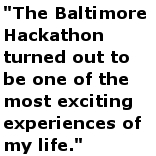 In its second year, the Baltimore Hackathon invites teams or individuals to build a hardware or software project from start to finish. Sporting the slogan "Meet People. Build Stuff. Have Fun.", this year's competition was held in Tide Point from June 8–10.
In its second year, the Baltimore Hackathon invites teams or individuals to build a hardware or software project from start to finish. Sporting the slogan "Meet People. Build Stuff. Have Fun.", this year's competition was held in Tide Point from June 8–10.
Among the more than ninety participants was UMBC student Ahmad Abbas, who took home the competition's DIY/Hacker prize for his hardware project. Originally from Egypt, Ahmad is finishing up his Master's degree in Computer Engineering under the supervision of Dr. Mohamed Younis in the ESNet Lab. He hopes to graduate this summer and begin Ph.D. studies at UMBC this Fall.
In the interview below, Ahmad talks about his experience at the Baltimore Hackathon and explains what made it "one of the most exciting experiences of [his] life."
How did you hear about the Baltimore Hackathon? I heard about the Baltimore Hackathon 2012 after reading a post by Dr.Tim Finin on myUMBC on Wednesday, just two days before the competition, and I decided to join at the same day.
What is the Baltimore Hackathon? The Hackathon is a competition where you work individually or on teams with the purpose of building hardware or software in a single weekend. Participants may submit an existing project as well, but they need to indicate this before entering the competition.
In a few words, explain your winning project. When I registered, I wasn't sure about my project's idea. My idea was to build a digital camera using 1.3 MPixel CMOS camera sensor, 2.4" LCD and SD card. I decided later, during the competition, to build shields, daughter boards, for Arduino kits. These boards can be connected to Arduino kits and used in different projects.
Where did you come up with the idea? I came up with this ides because I am skilled in designing and implementing electronic circuits. Some people need these circuits to build their own projects, but they can't design or implement it. I build these circuits to help them. This idea was not only for the competition. I built my first Arduino shield last semester in Dr.Ryan Robucci's class. It is an FPGA board that can be connected to Arduino kits. This board was one of my boards in the competition, too.
 I designed another two boards during the competition. One of them was a WiFi board for Arduino and the second was a Camera board for the Arduino. I built the WiFi, but I couldn't finish the camera board. Also, I built another USB enabled kit using a low-cost micro-controller and a small number of components. Last board was a DIY digital camera, which was the original idea. I designed the board but I didn't have time to build it.
I designed another two boards during the competition. One of them was a WiFi board for Arduino and the second was a Camera board for the Arduino. I built the WiFi, but I couldn't finish the camera board. Also, I built another USB enabled kit using a low-cost micro-controller and a small number of components. Last board was a DIY digital camera, which was the original idea. I designed the board but I didn't have time to build it.
Describe the Baltimore Hackathon. Was it stressful? Exciting? Were you intimidated by the other competitors, or did you collaborate and support one another? The Baltimore Hackathon turned out to be one of the most exciting experiences of my life. Although I was highly stressed during the competition, I was inspired by all the creative and hardworking participants. In order to reduce the stress, participants played different games, where I earned the title of "ping pong master" and a prize to go with the title.
I had the fortune over the course of the competition to meet Gary Mauler, Founder of Robot Fest and DIY Expo, and Amy Hurst, Assistant Professor of Human-Centered Computing at UMBC. Gary provided me with insights on how to move forward with my passion for building hardware.
The Hackathon would not have been such an incredible experience if it were not for the organizers and volunteers who made it possible. I would like to personally thank Jason, Kafu, Paris, and John.
Did you think you would win, or was the award a pleasant surprise? I won the Hacker DIY prize which comes with $500. I expected to win a prize because most of the participants were doing software projects.